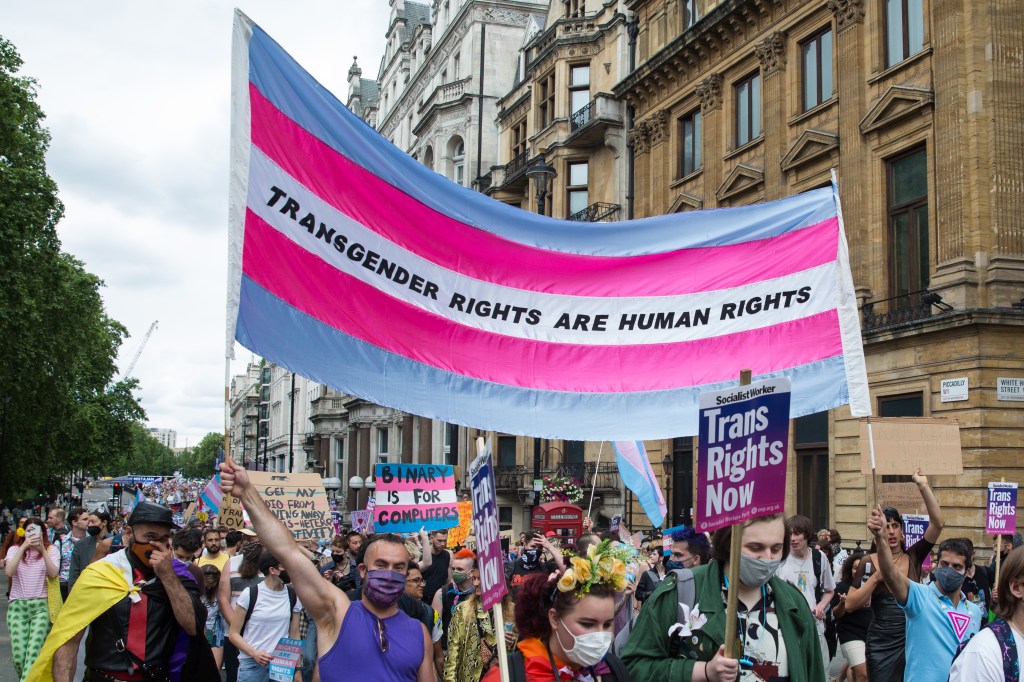Tory approved list of overseas GRCs includes countries forcing trans people to be sterilised

The government’s list of countries where it approves gender recognition processes has been updated. (Getty Images)
The government's list of countries where it approves gender recognition processes has been updated. (Getty Images)
Countries the UK government deems as having equally “rigorous” gender recognition laws include nations that see trans people sterilised, required to have surgery and forced to gain their family’s permission before they can transition.
On Wednesday (6 December), women and equalities minister Kemi Badenoch told MPs the government would conduct a “long overdue” update of its list of approved countries and territories from which trans migrants can apply for a British Gender Recognition Certificate (GRC) without having to supply medical documents.
Subject to approval, a number of locations are set to be added to the list whilst others – which have been on it since it was last updated in 2011 – will be removed.
The decision to update the list comes after a number of nations introduced self-ID, which has resulted in the Tories not now viewing these countries as having “similarly rigorous systems as the UK”.
The order states the following countries and territories will be added: Belarus; Bosnia and Herzegovina, China, Cuba, Georgia, India, Iran, Kazakhstan, Mongolia, Montenegro, Namibia, Panama, Sri Lanka and Taiwan.
Places that have been removed from the list include New Zealand, Belgium and the Netherlands, alongside US states such as California and Washington.
Research shows several of the countries set to be added to the list have archaic legal requirements that trans people must fulfil in order to legally change their gender, many of which do not seem to align with the UK’s system.

In Bosnia and Herzegovina, trans people may only legally change their gender if they complete a full medical transition, meaning it is a precondition of the legal process. By contrast, as per the UK’s GRC application page, Brits can apply if they have not “had any gender affirming surgery or treatments” not “plan to have any” in the future.
In China, whilst it is possible for trans people to legally change their names and gender markers on documents, they must – unlike in the UK – undergo gender-affirming surgeries as a necessary precondition.
As part of applying for the surgery, trans Chinese folks must also gain approval to pursue gender transition from their families and the human resource offices of their workplace or educational institution. Again, this is something trans people in the UK do not have to do.
In Kazakhstan, trans people who wish to legally change their gender must submit “to an arduous, humiliating, and expensive series of procedures” which include extensive physical and psychiatric medical examinations, hormone therapy, sterilisation and gender reassignment genital surgery.
More specifically, as laid out in rules by Decree No. 187 of the Minister of Health and Social Development of the Republic of Kazakhstan, trans people must undergo “burdensome, humiliating, time-consuming, and often prohibitively expensive” procedure which includes HIV tests, skull x-rays, appearances before a commission of psychiatrists and gender reassignment surgery – which includes being sterilised. Again, British people applying for a GRC do not need to undergo this.
“I felt like an object for research,” one Kazakh trans woman said of the procedure. “They can ask you a lot of inappropriate questions and if you’re not defensive about your boundaries they can easily violate them.”
Alongside this, trans people with mental health conditions and those below the age of 21 in Kazakhstan are barred from applying to legally change their gender. In the UK, there is no such restriction for those with mental health issues and people must be over 18 to apply.
In Iran, surgery is again required. But another factor in the legal process here is that adult, trans Iranians must provide a certified testimonial from their parents stating they approve of their child undergoing gender-affirming surgery. No such requirement exists in the UK system.
In Sri Lanka, applicants below the age of 21 also require parental approval to make amendments to the gender markers on their birth certificates. Here, legal gender recognition is only issued after the applicant receives psychiatric diagnosis of ‘transsexualism’ and undergoes hormone and surgical treatment.

During her speech in the House of Commons, Badenoch said: “It is this government’s policy that the UK does not recognise self-identification for the purpose of obtaining a Gender Recognition Certificate.”
She continued: “It should not be possible for a person who does not satisfy the criteria for UK legal gender recognition to use the overseas routes to do so.”
She added that there needs to be “parity” with UK applicants, whereby a trans migrant should be able to access a GRC more easily than a British national.

